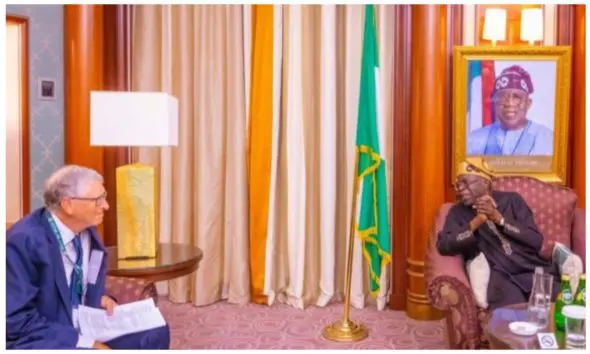President Bola Tinubu on Sunday, met with Microsoft founder and philanthropist, Bill Gates, on the sidelines of the World Economic Forum Special Meeting in Riyadh, Saudi Arabia, where they discussed the relevance of technology in the contemporary world.
Tinubu said his administration is investing in technology that is tailored towards ensuring transparency and accountability in government and accelerating public-sector performance and service delivery to the Nigerian people.
He stated that technology will remain a potent weapon against corruption and financial impropriety in public service.
Emphasising his unwavering commitment to deliver reliable technology that will support a national consumer credit system and many other critical new government interventions for all Nigerians, the President said resistance is often expected when efforts are made to strengthen systems and forestall malfeasance.
“Technology is the enemy of fraud, corruption, and irregularity. We have been working hard on improving technology.
“There is always the initial resistance. Corruption, self-interest, and fraudulent activity will always be an enemy, but when you bend that curve, you will receive the benefit. The nation will receive the benefit,” the President said.
Recounting how he deployed technology to enhance the revenue base of Lagos State as governor, President Tinubu said he ensured the collection and utilisation of essential data, creating an efficient tax system for the state.
“When I was governor of Lagos State, I faced challenges. I started with N600 million and ended up with over N8 billion. And right now, they are targeting a trillion naira with the use of technology in the state. There is no other shortcut. We must invest in technology. We must focus, be diligent, and work hard,” the President said.
In his remarks, Mr. Gates informed the President of a one-identity technological platform that can integrate variegated data, while explaining the centrality of data harmonisation to planning, security, and tax efficiency.
